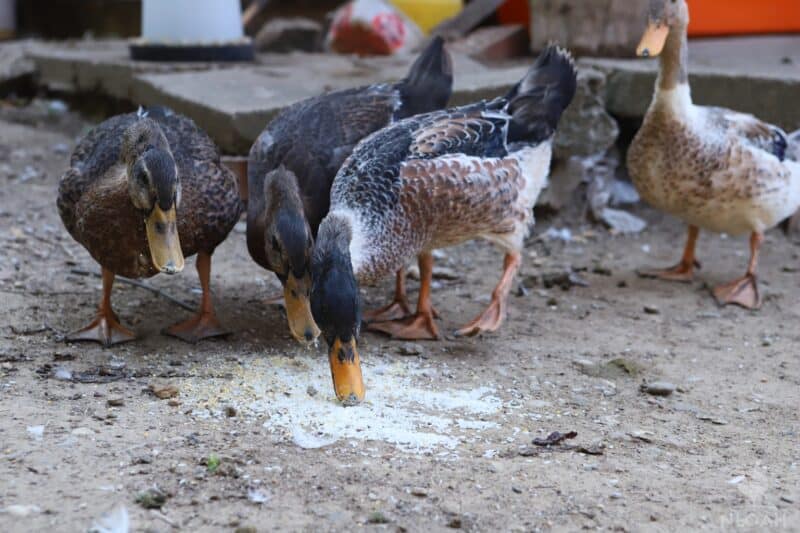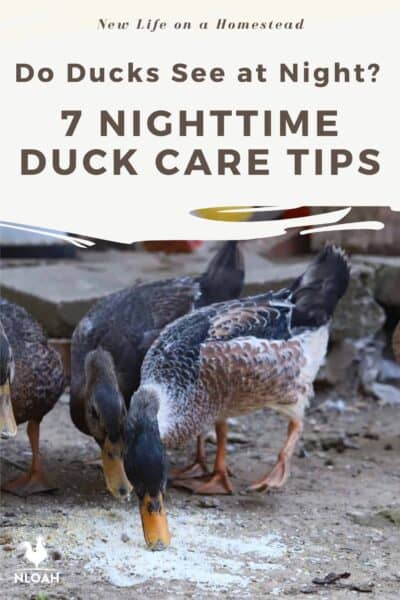Most of the animals that we keep, whatever species they are, tend to follow the same schedule that we do when it comes to sleeping. They get up with the sun and go to bed or at least settle down at dusk. But that’s not always the case with ducks…

Ask anybody who has kept ducks for any length of time, and they’ll tell you that they tend to be remarkably active at night. Suspiciously so! It seems peculiar, especially when you compare them to chickens, which invariably shut up in their coop when the sun goes down.
What’s the deal? Can ducks see that well at night?
Yes, ducks can see at night. Though not truly nocturnal, ducks have a high concentration of rods in each eye that allows them to see surprisingly well at night, especially with decent ambient light.
That definitely explains why ducks are active at all hours, both in the wild and in domestic settings. Lots of folks don’t know that little fact, especially if you’re only familiar with chickens.
Figuring out the nocturnal proclivities of ducks is an important part of taking care of them, so keep reading, and I’ll tell you more about their low-light vision and… some extra nighttime care tips.
Ducks Can See Well in Times of Low Light
As a rule, ducks see pretty well in times of low light, though they cannot see in absolute or near darkness like some people assert.
Compared to chickens, ducks see nearly as well in early dawn and late dusk as they do in the daytime. They also see remarkably well at night.
Now, don’t get it confused: they can’t see in the dark like owls can, but if they have starlight, moonlight, or any other kind of ambient lighting that they can make use of around your property, they will go on their merry way doing what they normally do in the daytime.
As mentioned above, this is because they have dense clusters of rods in their eyes, the same structures that people and other animals have for improved night vision.
This naturally gives them a big advantage in the dark, at least compared to most other birds and quite a few other animals!
Ducks Can See UV Light
One of the most fascinating things about ducks, and another factor in their excellent nighttime vision, is the fact that they can see into the ultraviolet spectrum.
This is because they have an additional type of cone, the receptor structures in the eye responsible for distinguishing colored light. Whereas humans have three colors, that fourth one gives ducks an entirely unique and, to us, quite literally unimaginable view of the world.
Surprisingly, scientists still aren’t entirely sure precisely how this ultraviolet spectrum affects the vision of ducks and how they react to and interact with the environment, but we know that it does make a difference.
Migratory waterfowl accidents concerning collisions with towers, power lines, and other structures were easily mitigated once any amount of ultraviolet light was shined on them at night.
Likely, the reflecting ultraviolet light coming off of the moon and stars has a higher value to ducks than it does to people thanks to this unique ability.
Ducks Can Be Surprisingly Active at Night
Ask any newbie duck owner (or someone who has neighbors who raise them) and they will tell you: ducks can be remarkably active, and noisy, at all hours of the night.
If you keep them pretty close to your house, it can be enough to drive you mad. If you have a noisy breed like Calls, Mallards, or Runners, you can be in for a lot of lost sleep.
This also means you should plan on your ducks being up, active, and wanting to roam around outside the coop at least some of the time. They’ll want to eat, drink, get into the water, and do all of the other things they usually do in the daytime.
Part of this is because ducks tend not to have a set sleeping schedule; they like to grab a nap and get a little shut-eye whenever the mood strikes them throughout the day, meaning they can have plenty of energy when the sun sets.
Encourage Them to Stick to a Sleeping Schedule When Young
It might seem hopeless trying to get your ducks to stick to a schedule and settle down at night, and sometimes it is, I’ll be honest. But nonetheless, there are some things you can do early on that can make a difference.
When your ducks are very young, still ducklings, it’s possible to get them used to a typical nighttime schedule if you work at it.
Getting them to bed down for the night inside a heat cave or other enclosure inside the brooder, and then turning off all the lights so they aren’t disturbed, can instill in them a tendency to head for home when the sun sets, and then wait for dawn before coming back out.
I have a couple of friends who reported great success with this method among their Cayugas, but despite this, they have a few who simply won’t go with the program. Nonetheless, it definitely won’t hurt to try and get your ducks on a schedule young.
If the Moon is Out, Your Ducks Might Be, Too!
I mentioned up above that ducks can see pretty well in the dark, but I’m not referring to conditions of true, blackout darkness.
A very dark night might make your ducks uncertain and keep them closer to the coop, but I’ll make you a bet right now: on clear nights, especially ones with a full moon, you can count on your ducks being up, out, and roaming. That’s because they can make great use of all ambient light.
This little fact can work for you or against you depending on your preferences, but all you need to know is that the more light your ducks have at night, the more active they will be.
Consider Using Small, Soft Lights on the Outside of Their Shelter
A good tip that makes a big difference in the wellness of your ducks if you’re going to let them roam around at night is to put a small, soft light on the outside of their shelter.
Ducks are smart, and they’ll quickly come to associate this little night light with home, making it less likely for them to get disoriented in times of darkness.
However, you definitely want to avoid putting any kind of lights inside the shelter itself because this can disturb them when they’re actually trying to get some sleep.
Likewise, don’t allow bright lights to shine through windows and openings. If you have security lights or any other outdoor lighting on your home or surrounding buildings, aim them away from the duck house.
Minimize Reflective Surfaces
All seasoned duck keepers know that ducks tend to get fascinated by shiny and reflective objects. They’re somewhat notorious for eating metal washers, screws, and other things that they shouldn’t because of this tendency!
And, whatever the reason, reflective objects can sometimes confuse ducks, especially at night. It probably has something to do with the fact they can see ultraviolet as discussed above, or maybe because they associate it with the surface of the water.
You don’t have to worry about your ducks moving around at night as long as they’re safe, but you can make things easier for them by matting down or getting rid of reflective surfaces like glass, shiny plastic tarps, and so forth. They will be looking for wide, reflective surfaces to help them find the water at night.
Ducks Must Have Protection from Nighttime Predators!
Last but certainly not least, take pains to protect your ducks from predators at night. They need protection from predators all the time, but especially at night!
The most common and ravenous duck predators, including coyotes, foxes, badgers, raccoons, and owls, are all highly active at night and have a big advantage when they are out looking for food or prowling and growling.
Consider a fenced enclosure to be the absolute minimum if you want to keep your ducks safe from predation. Depending on what sort of animals are in your area, you might need to bury the fencing at least 6 inches or even use a gravel “moat” on either side to keep some predators from digging under it.
Owls, on the other hand, are very hard to stop if you don’t have your ducks in a covered run. Cargo netting or mesh is pretty much the only thing that will reliably keep them from picking off a duck at night, though they might not bother larger breeds.

Tom has lived and worked on farms and homesteads from the Carolinas to Kentucky and beyond. He is passionate about helping people prepare for tough times by embracing lifestyles of self-sufficiency.
